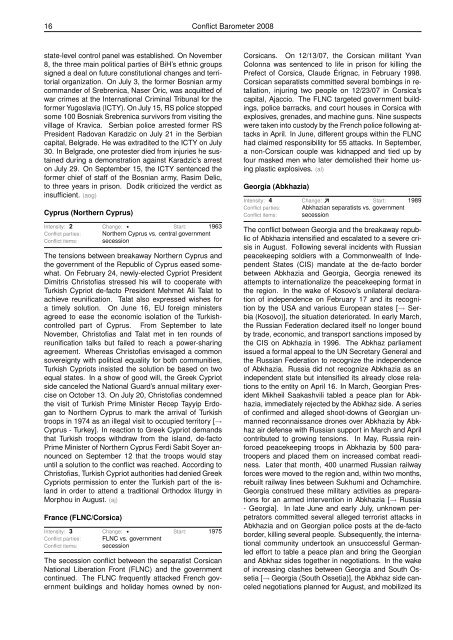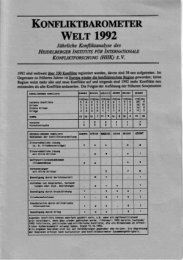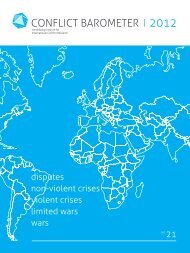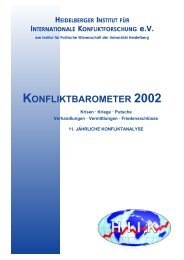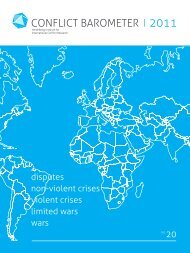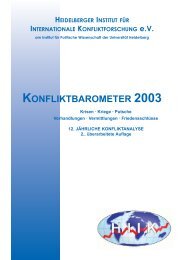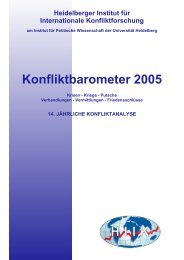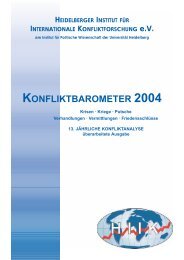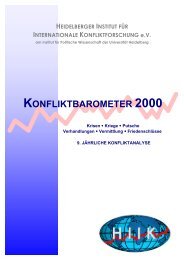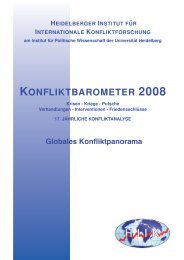CONFLICT BAROMETER 2008
CONFLICT BAROMETER 2008
CONFLICT BAROMETER 2008
You also want an ePaper? Increase the reach of your titles
YUMPU automatically turns print PDFs into web optimized ePapers that Google loves.
16 Conflict Barometer <strong>2008</strong><br />
state-level control panel was established. On November<br />
8, the three main political parties of BiH’s ethnic groups<br />
signed a deal on future constitutional changes and territorial<br />
organization. On July 3, the former Bosnian army<br />
commander of Srebrenica, Naser Oric, was acquitted of<br />
war crimes at the International Criminal Tribunal for the<br />
former Yugoslavia (ICTY). On July 15, RS police stopped<br />
some 100 Bosniak Srebrenica survivors from visiting the<br />
village of Kravica. Serbian police arrested former RS<br />
President Radovan Karadzic on July 21 in the Serbian<br />
capital, Belgrade. He was extradited to the ICTY on July<br />
30. In Belgrade, one protester died from injuries he sustained<br />
during a demonstration against Karadzic’s arrest<br />
on July 29. On September 15, the ICTY sentenced the<br />
former chief of staff of the Bosnian army, Rasim Delic,<br />
to three years in prison. Dodik criticized the verdict as<br />
insufficient. (aog)<br />
Cyprus (Northern Cyprus)<br />
Intensity: 2 Change: Start: 1963<br />
Conflict parties: Northern Cyprus vs. central government<br />
Conflict items: secession<br />
The tensions between breakaway Northern Cyprus and<br />
the government of the Republic of Cyprus eased somewhat.<br />
On February 24, newly-elected Cypriot President<br />
Dimitris Christofias stressed his will to cooperate with<br />
Turkish Cypriot de-facto President Mehmet Ali Talat to<br />
achieve reunification. Talat also expressed wishes for<br />
a timely solution. On June 16, EU foreign ministers<br />
agreed to ease the economic isolation of the Turkishcontrolled<br />
part of Cyprus. From September to late<br />
November, Christofias and Talat met in ten rounds of<br />
reunification talks but failed to reach a power-sharing<br />
agreement. Whereas Christofias envisaged a common<br />
sovereignty with political equality for both communities,<br />
Turkish Cypriots insisted the solution be based on two<br />
equal states. In a show of good will, the Greek Cypriot<br />
side canceled the National Guard’s annual military exercise<br />
on October 13. On July 20, Christofias condemned<br />
the visit of Turkish Prime Minister Recep Tayyip Erdogan<br />
to Northern Cyprus to mark the arrival of Turkish<br />
troops in 1974 as an illegal visit to occupied territory [→<br />
Cyprus - Turkey]. In reaction to Greek Cypriot demands<br />
that Turkish troops withdraw from the island, de-facto<br />
Prime Minister of Northern Cyprus Ferdi Sabit Soyer announced<br />
on September 12 that the troops would stay<br />
until a solution to the conflict was reached. According to<br />
Christofias, Turkish Cypriot authorities had denied Greek<br />
Cypriots permission to enter the Turkish part of the island<br />
in order to attend a traditional Orthodox liturgy in<br />
Morphou in August. (aj)<br />
France (FLNC/Corsica)<br />
Intensity: 3 Change: Start: 1975<br />
Conflict parties: FLNC vs. government<br />
Conflict items: secession<br />
The secession conflict between the separatist Corsican<br />
National Liberation Front (FLNC) and the government<br />
continued. The FLNC frequently attacked French government<br />
buildings and holiday homes owned by non-<br />
Corsicans. On 12/13/07, the Corsican militant Yvan<br />
Colonna was sentenced to life in prison for killing the<br />
Prefect of Corsica, Claude Érignac, in February 1998.<br />
Corsican separatists committed several bombings in retaliation,<br />
injuring two people on 12/23/07 in Corsica’s<br />
capital, Ajaccio. The FLNC targeted government buildings,<br />
police barracks, and court houses in Corsica with<br />
explosives, grenades, and machine guns. Nine suspects<br />
were taken into custody by the French police following attacks<br />
in April. In June, different groups within the FLNC<br />
had claimed responsibility for 55 attacks. In September,<br />
a non-Corsican couple was kidnapped and tied up by<br />
four masked men who later demolished their home using<br />
plastic explosives. (al)<br />
Georgia (Abkhazia)<br />
Intensity: 4 Change: Start: 1989<br />
Conflict parties: Abkhazian separatists vs. government<br />
Conflict items: secession<br />
The conflict between Georgia and the breakaway republic<br />
of Abkhazia intensified and escalated to a severe crisis<br />
in August. Following several incidents with Russian<br />
peacekeeping soldiers with a Commonwealth of Independent<br />
States (CIS) mandate at the de-facto border<br />
between Abkhazia and Georgia, Georgia renewed its<br />
attempts to internationalize the peacekeeping format in<br />
the region. In the wake of Kosovo’s unilateral declaration<br />
of independence on February 17 and its recognition<br />
by the USA and various European states [→ Serbia<br />
(Kosovo)], the situation deteriorated. In early March,<br />
the Russian Federation declared itself no longer bound<br />
by trade, economic, and transport sanctions imposed by<br />
the CIS on Abkhazia in 1996. The Abkhaz parliament<br />
issued a formal appeal to the UN Secretary General and<br />
the Russian Federation to recognize the independence<br />
of Abkhazia. Russia did not recognize Abkhazia as an<br />
independent state but intensified its already close relations<br />
to the entity on April 16. In March, Georgian President<br />
Mikheil Saakashvili tabled a peace plan for Abkhazia,<br />
immediately rejected by the Abkhaz side. A series<br />
of confirmed and alleged shoot-downs of Georgian unmanned<br />
reconnaissance drones over Abkhazia by Abkhaz<br />
air defense with Russian support in March and April<br />
contributed to growing tensions. In May, Russia reinforced<br />
peacekeeping troops in Abkhazia by 500 paratroopers<br />
and placed them on increased combat readiness.<br />
Later that month, 400 unarmed Russian railway<br />
forces were moved to the region and, within two months,<br />
rebuilt railway lines between Sukhumi and Ochamchire.<br />
Georgia construed these military activities as preparations<br />
for an armed intervention in Abkhazia [→ Russia<br />
- Georgia]. In late June and early July, unknown perpetrators<br />
committed several alleged terrorist attacks in<br />
Abkhazia and on Georgian police posts at the de-facto<br />
border, killing several people. Subsequently, the international<br />
community undertook an unsuccessful Germanled<br />
effort to table a peace plan and bring the Georgian<br />
and Abkhaz sides together in negotiations. In the wake<br />
of increasing clashes between Georgia and South Ossetia<br />
[→ Georgia (South Ossetia)], the Abkhaz side canceled<br />
negotiations planned for August, and mobilized its


